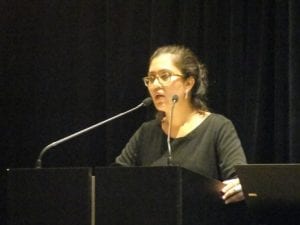The question of caste in modern India
Author and scholar Anupama Rao provided insights Thursday into the caste system’s place in modern India to an audience of about 130. This event was organized by the UCF Global Perspectives Office as a part of the 2012-2013 theme, “The Changing Face of Freedom in Today’s Turbulent Times,” as well as the season’s first public event of The India Center at UCF.
With a background in anthropology and history, Rao looked at the caste system as one of the central influences on India’s political culture.
From the start of her speech, she emphasized, “In order to understand India’s democracy, we have to understand caste.” She acknowledged how society in India responds to the idea of equality differently from those of Europe and America, because caste becomes an important factor; it is rooted in the Hindu faith and thus the culture. 
The caste system and, more specifically, the practice of untouchability, has created division that continues to affect the democracy’s development today. Rao explained that in politics, one can have “one man, one vote,” but in the social and economic realm, “the concept of one man, one vote is denied.”
Through her explanation, Rao shared the views the views of Mahatma Gandhi and B.R Ambedkar in relation to the affirmative action efforts that swept through India in the 1880s. Gandhi felt that caste was not a matter of being but of one’s actions. He asserted that the ill-treatment of the Dalit, or untouchables, is a greater problem for the higher caste than it is for the untouchables themselves.
Rao summarized Gandhi’s solution for inequality in this way, that “when those of the high caste do manual work, then there will be equality.” She also included some thoughts from Ambedkar, saying, “the untouchables require political rights to undertake self-reform,” which begged the question: If untouchability goes, will Hinduism as a religion also be abolished?
Today, India is the largest democracy in the world with a thriving economy. Rao said all societies face “the question of how we can balance individual rights against groups or collective rights.”
When asked, in terms of social and economic development, will India’s culture ever be able to overcome the system, Rao said, “The caste has changed radically.” She pointed out the importance of inequality in terms of a globalized India.
Although violence and inequality are still present in certain settings, she noted, there is a blurring of caste identity in urbanized areas. Rao reflected on how much the Dalit are actually embracing globalization and how “economic development is actually breaking down social and hierarchical barriers.”
In addition to the Global Perspectives Office and The India Center, sponsors and partners included The India Group, Anil and Chitra Deshpande India Program Endowed Fund, Lawrence J. Chastang and the Chastang Foundation, UCF International Services Center, UCF Political Science Department, UCF Women’s Studies Program, UCF LIFE, UCF Book Festival 2013 in association with the Morgridge International Reading Center and the Global Connections Foundation.
